For small and medium-sized manufacturers, growth is all about efficiency. You're juggling requests for quotes, managing technical specifications, and trying to keep track of a handful of large, high-value deals.
But if you're like many in the industry, you're still relying on spreadsheets and manual processes, which leads to lost data, missed opportunities, and the nagging feeling that you're falling behind.
It's a frustrating situation: you know a Customer Relationship Management (CRM) system could help, but the market is full of options, and most seem built for every industry except yours. How can a CRM help with things like inventory management, order tracking, or demand forecasting?
This guide breaks down what a CRM can do for your business and highlights some of the top platforms that are a good fit for manufacturing.
We’ll look at everything from specialized solutions built just for your industry to flexible options that can be adapted to your unique needs.
TL;DR:
Manufacturing businesses lose deals to poor lead tracking, not bad products. Here are 5 CRM platforms that can fix that:
1. Gushwork - The only CRM built exclusively for manufacturers. Goes beyond basic lead tracking to include integrated marketing, SEO, and content systems.
2. HubSpot CRM - Free tier makes it perfect for testing CRM waters. Good pipeline visualization and email integration. Starting point for small manufacturers new to CRM.
3. Salesforce Manufacturing Cloud - Enterprise-level solution with advanced forecasting and AI insights. Expensive ($150+/month) but handles complex global operations.
4. SugarCRM - Highly customizable with strong ERP integration capabilities. Mid-range pricing ($52-85/month) for manufacturers with specific workflow needs.
5. Zoho CRM - Budget-friendly option ($14/month) with quote management and inventory integration. Good for small manufacturers and startups.
Most manufacturers need to fix their lead generation before worrying about CRM features. Gushwork addresses this by combining CRM with marketing infrastructure, while the others focus purely on managing leads you already have.
1. Gushwork - Built Exclusively for Manufacturers

When it comes to a CRM for manufacturing, most companies miss the point. You're offered a piece of software and it's called a solution. But for you, the real problem isn't just a lack of software, it's a lack of a cohesive system.
You're losing leads because your website isn't connected to your sales team. You're spending too much time on manual tasks because your CRM isn't built for leads. You're trying to grow, but you’re stuck managing a scattered collection of tools that don't talk to each other.
Gushwork is different because it’s not just a CRM; it’s an integrated marketing and sales infrastructure built specifically for the way manufacturers do business.
Gushwork understands that your buyers are different. They're technical. They need detailed information. The sales cycle isn't a simple funnel, it's a complex journey from a technical specification to a final quote. You can't rely on generic tools.
This single, powerful system takes a buyer from their first search to their final order. The system is built to optimize your website to attract the right people, create content that answers their technical questions, and implement a lead management system that's ready for your leads.
How Gushwork Solves Your Biggest Problems:
- You're losing leads and opportunities. Gushwork ensures every lead is captured and routed correctly from the first moment of contact. The platform provides pre-built workflows for managing leads and technical specifications, so you never miss a detail or a deadline again.
- Your sales and marketing teams are out of sync. With Gushwork, your website, content, SEO, and lead tracking all work as one cohesive unit. Marketing generates the right leads, and your CRM gives your sales team the full context they need to close the deal.
- You’re tired of managing complex, disconnected tools. Gushwork offers a complete, single solution. You won't need to duct-tape a generic CRM to an external marketing tool. The system is designed to handle your specific needs, from multi-location inventory visibility to built-in compliance tracking.
- You want to build long-term value, not just short-term campaigns. Gushwork builds an engine that gets stronger over time. Your SEO improves, your content library grows, and your CRM data becomes a valuable asset for future growth.
Best For: Mid-market manufacturers who need an industry-specific solution and a complete marketing system that understands their unique pain points and is built for long-term growth.
2. HubSpot CRM - Free Entry Point with Scaling Options
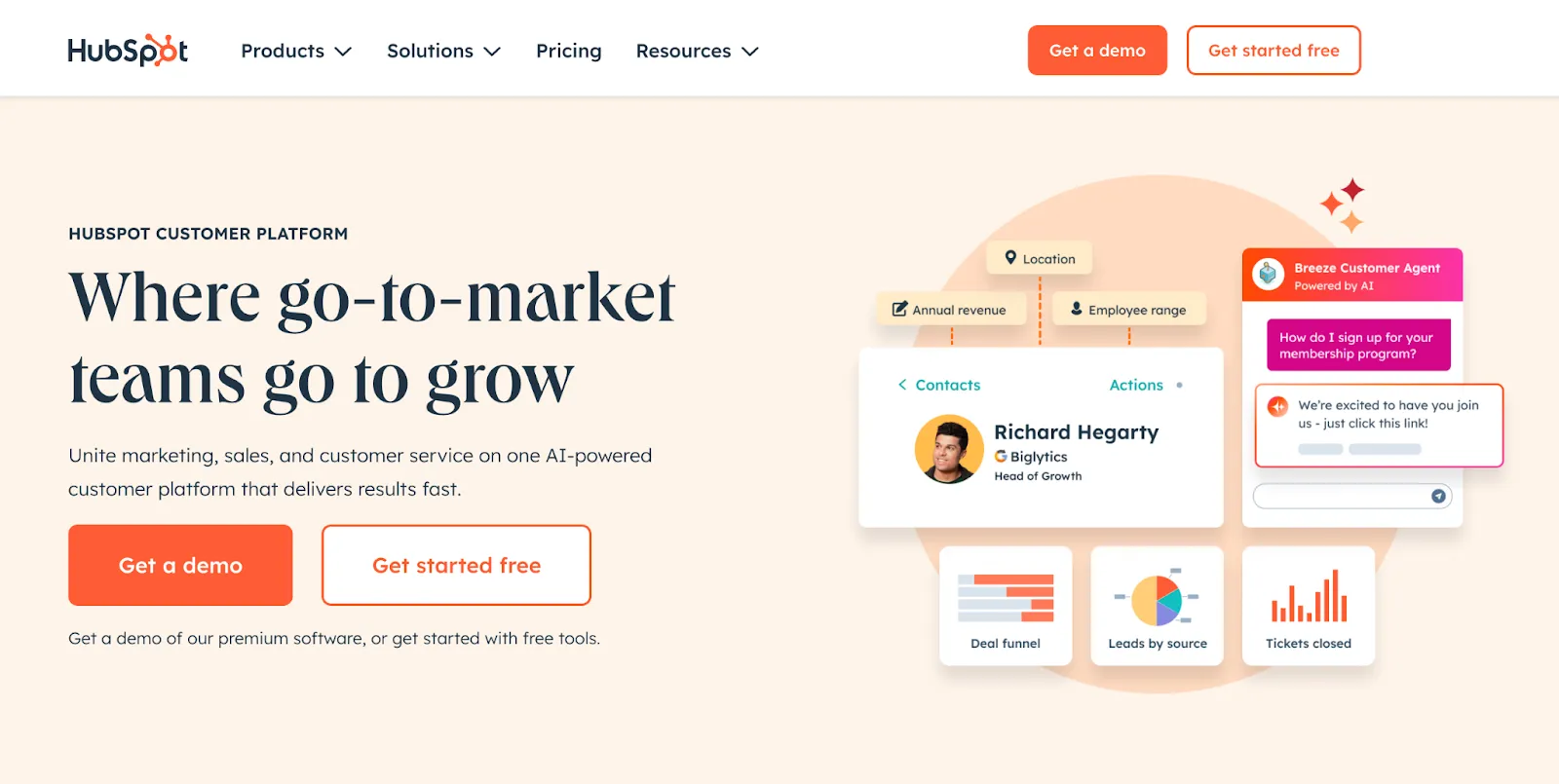
HubSpot is a household name in the CRM world, and for good reason. Its freemium model makes it an excellent starting point for manufacturing SMBs who want to test the waters of a CRM without a significant financial commitment.
Key Features
- Free Tier: The free version offers basic but powerful tools for contact management, deal pipelines, and task automation.
- Email Marketing Integration: Easily manage email communication with leads and customers directly within the platform.
- Deal Pipeline Customization: You can customize the sales pipeline to match your specific sales stages, from initial inquiry to closed deal.
- Document Management: Store and share quotes, proposals, and product documents with your team and clients.
Lead Tracking
HubSpot provides a visual pipeline that lets you see where every deal stands. You can use its lead scoring to prioritize which leads to follow up with and see a complete activity timeline for every contact.
Pricing
The free tier is a great starting point, with paid plans offering more advanced features starting at $45/user/month.
Best For
Small manufacturers who are new to CRM and want an easy-to-use platform with a generous free tier to get started.
3. Salesforce Manufacturing Cloud
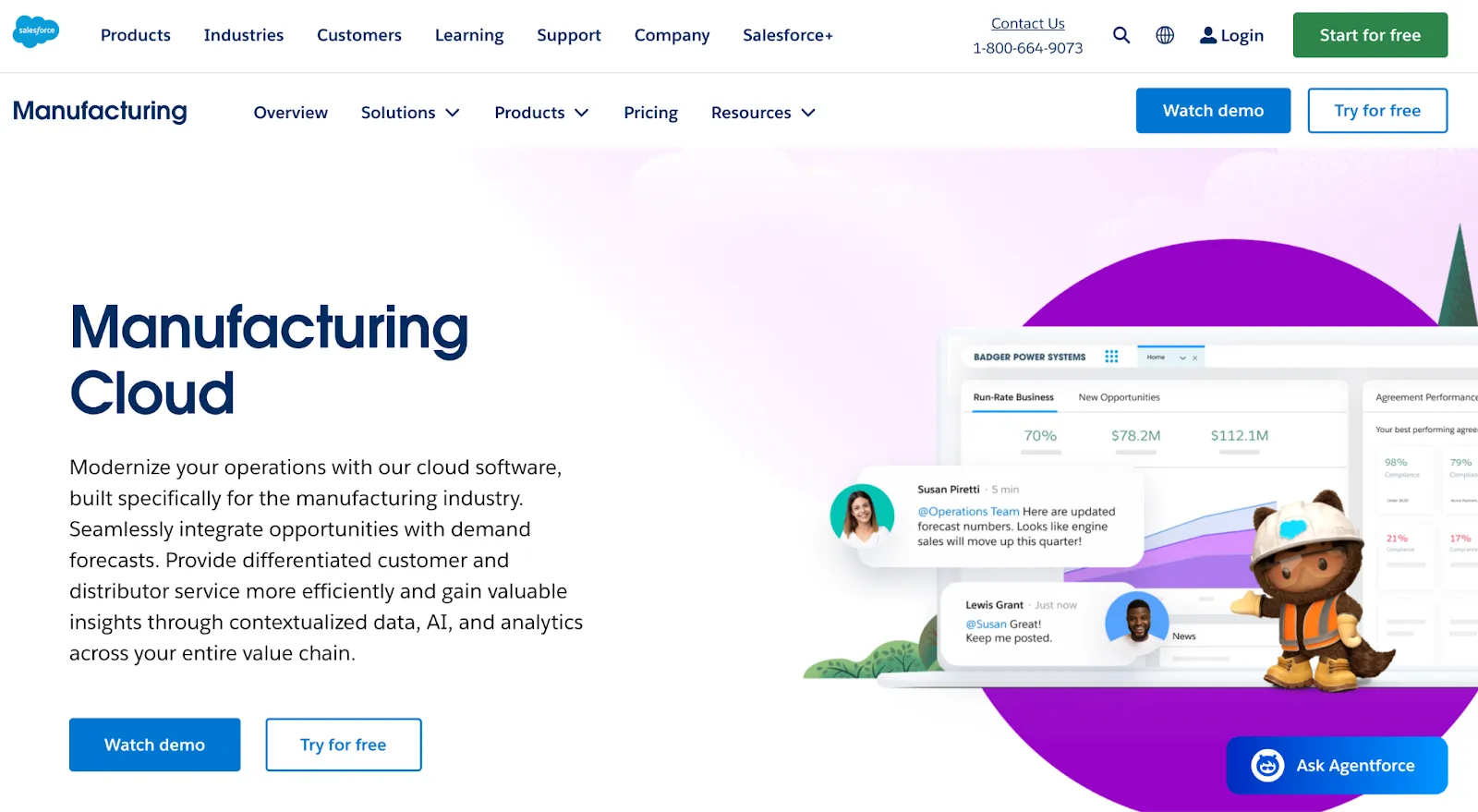
For larger enterprises and those with complex global operations, Salesforce Manufacturing Cloud offers a robust and comprehensive solution. It's built on the world's leading CRM platform but with modules specifically designed to address the needs of the manufacturing sector.
Key Strengths
- Account-Based Selling: Tools that help you manage and grow relationships with key accounts and partners.
- Partner Relationship Management: Effectively manage your network of dealers, distributors, and other channel partners.
- Advanced Forecasting: Use sophisticated tools to predict demand and manage sales forecasts with greater accuracy.
- AI-Powered Insights: Get data-driven recommendations on how to prioritize leads, improve sales processes, and identify new opportunities.
Lead Tracking
Salesforce provides a highly comprehensive lead tracking system with advanced analytics and reporting capabilities. It can handle large-scale data and complex sales processes with ease.
Pricing
Pricing is on the higher end, starting at around $150/user/month. This is a premium solution for businesses with a premium budget.
Best For
Large manufacturers with complex sales processes, global operations, and a need for highly advanced forecasting and analytics.
4. SugarCRM - Flexible and Customizable
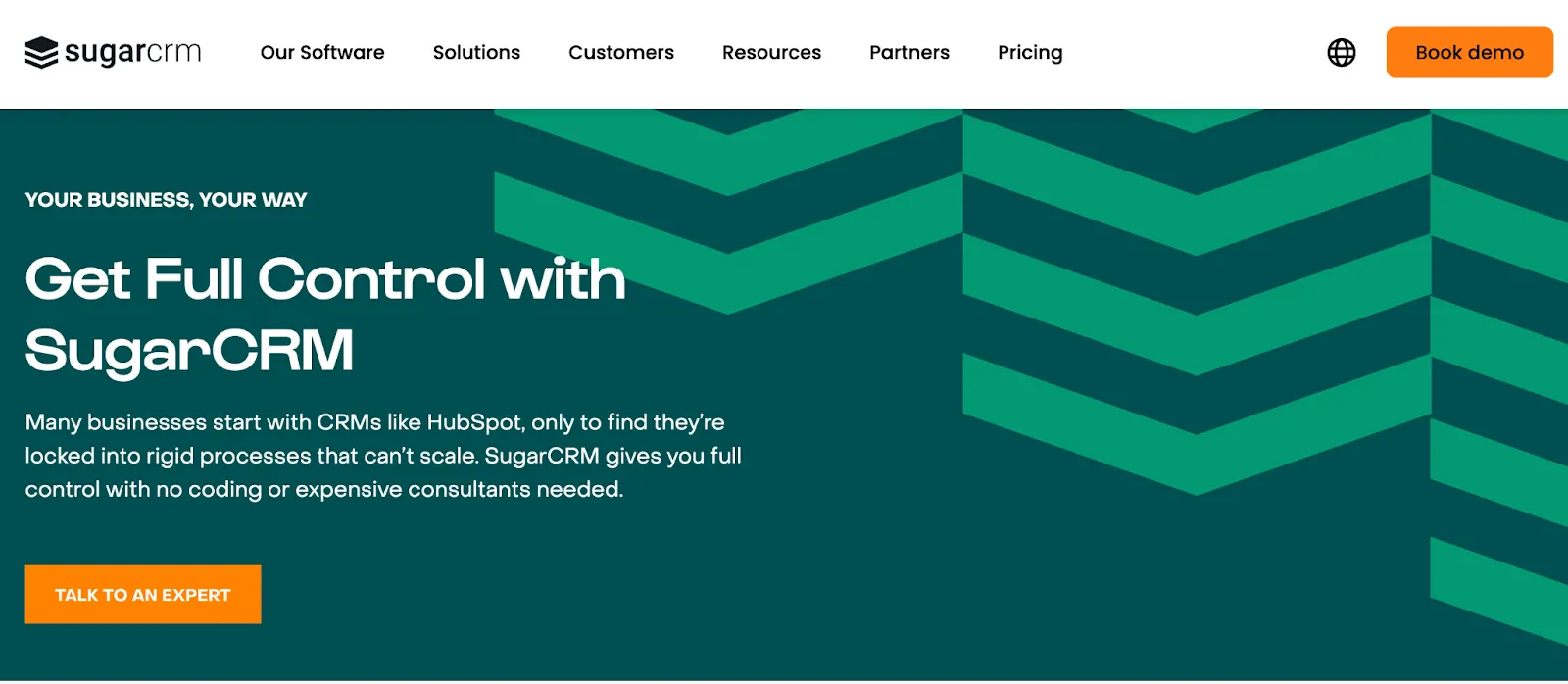
SugarCRM is a great option for manufacturers who need a highly customizable platform that can be tailored to their specific workflows. Built on an open-source foundation, it offers flexibility that many other CRMs don't.
Key Strengths
- Highly Customizable Workflows: You can design and automate custom workflows that match your unique sales and production processes.
- Strong ERP Integration Capabilities: SugarCRM is known for its ability to integrate with Enterprise Resource Planning (ERP) systems, which is critical for tying sales to production and inventory.
- Channel Partner Management: Tools to help you manage relationships and sales with your channel partners.
Lead Tracking
SugarCRM offers customizable pipelines and detailed reporting, so you can track leads in a way that makes sense for your business.
Pricing
Mid-range pricing, with plans starting at around $52-$85/user/month.
Best For
Manufacturers who have specific workflow requirements or a need for deep integration with existing ERP systems.
5. Zoho CRM - Another Popular Option
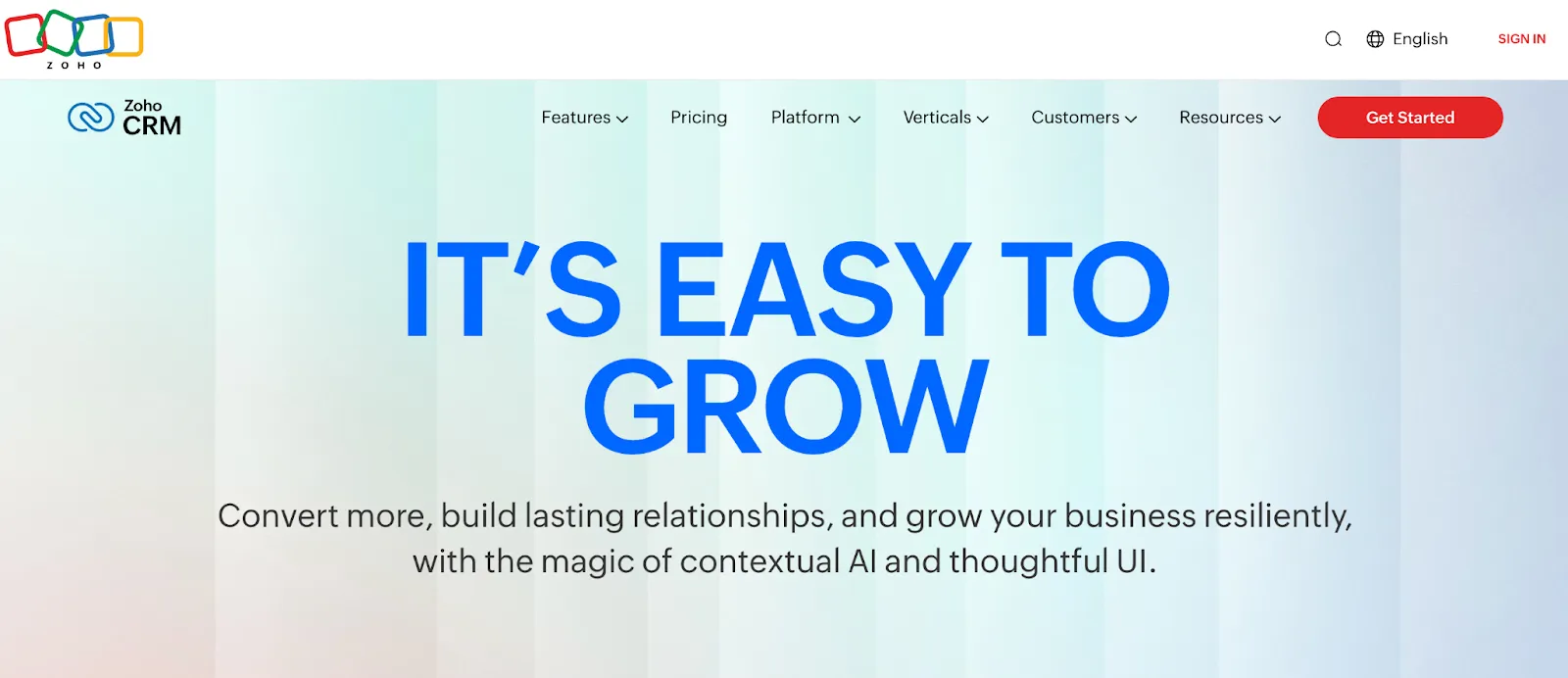
For small businesses just starting their CRM journey, Zoho CRM is an excellent and affordable choice. It offers a wide range of features, with specific add-ons that can be useful for manufacturers.
Key Features
- Quote Management: Generate and send quotes directly from the CRM, streamlining the quoting process.
- Inventory Integration: Connect with your inventory system to get real-time stock levels and manage orders.
- Multi-channel Lead Capture: Capture leads from your website, social media, and other channels.
Lead Tracking
Zoho provides a clean and intuitive interface for tracking leads and managing deals, with enough features to get the job done without being overwhelming.
Pricing
Pricing is highly competitive, starting at just $14/user/month, making it one of the most budget-friendly options on the market.
Best For
Small manufacturers and startups looking for an affordable yet powerful CRM with room to grow.
Even with a budget-friendly and powerful tool like Zoho, a common challenge remains: understanding how a CRM will fit into your existing, often manual, processes. You can have the best tool in the world, but if you don't know how to use it to solve your real-world problems, it won't help you grow.
But Wait, Will Any of These Actually Help You?
Now that you've seen your options, let's make sure you're solving the right problem. Even with a budget-friendly and powerful tool like Zoho, a common challenge remains: understanding how a CRM will fit into your existing, often manual, processes.
You can have the best tool in the world, but if you don't know how to use it to solve your real-world problems, it won't help you grow.
Before investing time and money in a CRM system, you need to honestly assess whether your current problems are ones that CRM can actually solve.
Here are the warning signs that indicate a CRM would make a real difference for your manufacturing business.
Still Using Spreadsheets? It's Time to Move On
If you're tracking leads and customers in spreadsheets, you're probably experiencing these problems: someone updates the wrong version of the file, critical information gets lost when people forget to save changes, and your team wastes time searching through multiple sheets to find basic customer details.
Here's the test: Can anyone on your team instantly tell you the status of your top 10 prospects right now?
If the answer involves opening multiple files, making phone calls, or checking different email threads, a CRM will help. When customer information is scattered across spreadsheets, emails, and people's heads, you're losing deals because of poor organization, not poor products or pricing.
Can't See the Bigger Picture? CRM Gives You the Full View
Ask yourself these questions: Do you know how many leads you got last month versus this month? Can you predict which deals are most likely to close next quarter? When a customer calls upset about a delayed order, does your team scramble to piece together what happened?
If you can't answer these questions quickly, you're operating blind.
Manufacturing businesses deal with long sales cycles and complex projects where small details matter. When you can't see the full picture of your sales pipeline and customer relationships, you make reactive decisions instead of strategic ones.
A CRM gives you the data visibility needed to spot trends, predict problems, and allocate resources effectively.
What If CRM Isn't Your Real Problem?
You might be thinking, "I've tried a CRM, and it didn't work." But before you blame the software, it's important to ask yourself some tough questions about the foundation of your business: your marketing and lead generation. A CRM is a fantastic tool for managing leads, but it can't create them out of thin air.
Are You Even Getting Enough Leads?
If your marketing isn't generating enough qualified leads, no CRM in the world will fix that. It's crucial to have a solid marketing engine in place first to drive traffic and capture interest. A CRM is only as effective as the leads it receives. Without a steady stream of qualified prospects, even the most advanced CRM will sit empty.
Are You Capturing Leads the Right Way?
Once you start generating leads, are you capturing them in a way that provides the most value? Are you using well-designed website forms? Are you offering valuable content downloads?
A good CRM helps you track and manage these leads, but you have to make sure your lead capture methods are effective. The data you put into the CRM is what you'll get out of it.
It Might Be Time to Look at Your Marketing, Not Just the CRM
If you're not seeing the results you want, it might not be the CRM. It might be time to evaluate your entire marketing system. Are you reaching the right people? Are your messages compelling? If you fix the foundation, a CRM can then become the powerful engine that helps you convert leads into customers.
So What Should You Actually Look For in a Manufacturing CRM?
Now that you understand what's available and what problems CRM actually solves, let's talk about choosing wisely. You don't need a system with hundreds of features you'll never use. You need a tool that's simple, powerful, and tailored to your specific needs.
The key is to avoid the overwhelming list of features and focus on what truly matters for growth.
Keep It Simple, But Powerful
Your ideal CRM should focus on a few core functionalities: a clear sales pipeline to monitor the status of every deal, tools to capture and nurture leads effectively, and automation for repetitive tasks like follow-up reminders.
These are the essentials that will deliver the most value without overwhelming your team.
Look for features that specifically address manufacturing challenges, such as the ability to attach technical specifications to deals, track RFQ responses, and manage long sales cycles with multiple touchpoints.
The interface should be intuitive enough that your team will actually use it, not so complex that it becomes another burden.
Integration is Key
A siloed CRM is a useless CRM. Make sure the platform you choose can easily integrate with the other tools you already use, such as your email marketing platform, accounting software, and even your inventory management system. This ensures a seamless flow of data across your entire operation.
The best CRMs for manufacturing connect with ERP systems, allowing you to see inventory levels when making promises to customers and automatically updating production schedules when deals close.
This integration eliminates duplicate data entry and ensures everyone is working with the same information.
The Real Benefits You'll See with the Right Manufacturing CRM
Now that you know what to prioritize when evaluating CRM options, let's talk about what success actually looks like.
Say Goodbye to Lost Leads and Missed Opportunities
Every manufacturing business has horror stories about leads that got lost in the shuffle. Someone called asking for a quote, but the message got buried in emails.
A potential customer filled out a form on your website, but nobody followed up for a week. These missed opportunities add up fast when you're dealing with high-value deals.
A CRM eliminates these problems by creating a systematic approach to lead capture and follow-up. Every inquiry is automatically logged, assigned to the right person, and tracked until completion.
You'll have automated reminders for follow-ups, so no lead sits ignored. For manufacturing SMBs where each deal can represent significant revenue, this level of organization can be the difference between hitting your growth targets and falling short.
Improve Communication Across Your Team
In many manufacturing companies, the sales team operates independently from production, and customer service works in its own silo. This disconnect creates confusion about order status, delivery timelines, and customer requirements.
When a customer calls with a question, your team spends valuable time tracking down information instead of solving problems.
A CRM breaks down these barriers by centralizing all customer information. Your sales rep can see production schedules, your production manager can access customer specifications, and your customer service team knows the complete history of every interaction.
This improved communication leads to faster response times, fewer errors, and ultimately, happier customers who see your company as organized and professional.
Scale with Ease
The biggest challenge for growing manufacturing businesses isn't just getting more customers—it's managing the increased complexity without drowning in administrative work. As your customer base grows, manual processes become increasingly difficult to maintain.
A CRM grows with your business by automating routine tasks and providing the structure needed to handle increased volume.
You can manage twice as many customers without doubling your administrative workload. The system handles lead scoring, follow-up reminders, and status updates automatically, freeing your team to focus on what they do best: building relationships and closing deals.
That’s all! Now Take the Next Step: Optimize Your Manufacturing Business with CRM
Most manufacturers make the mistake of jumping straight into CRM selection without addressing the fundamentals.
The manufacturing companies that see real results from CRM follow a different playbook. They fix their lead generation engine first, choose tools their team will actually use, and integrate everything from day one. This approach turns CRM from an expensive data repository into a revenue-generating machine.
Here's your roadmap to CRM success:
Step 1: Fix Your Lead Generation First
If you're getting fewer than 10-15 qualified leads monthly, your marketing needs work before any CRM can help. Audit your website: Can prospects find you easily and understand what you do?
Most manufacturing sites bury their value proposition under technical specs.
Step 2: Choose the Right Fit
Get input from everyone who'll actually use the system daily. Don't get swayed by flashy features in sales presentations, focus on whether your team can actually navigate the system and complete their daily tasks efficiently.
Step 3: Plan Integration from Day One
Map your current process first, then choose a CRM that fits your workflow rather than forcing your team to adapt to the software. Connect it to your existing tools immediately, duplicate data entry kills adoption faster than poor training.

















.webp)



.webp)








.webp)
.svg)


.svg)
.svg)
.svg)



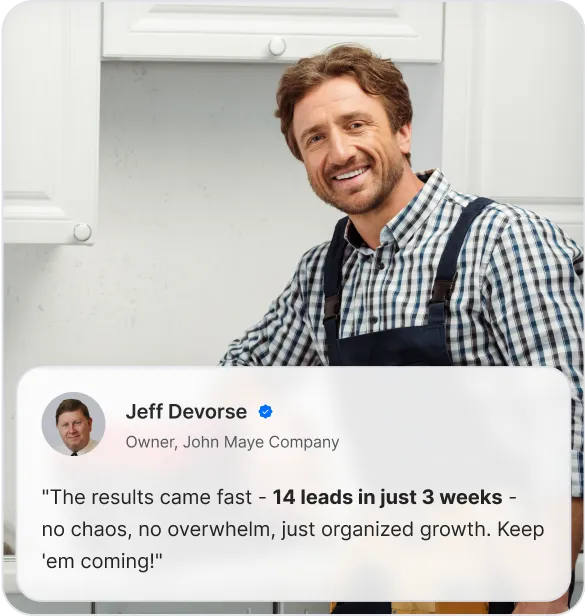
.svg)





.svg)